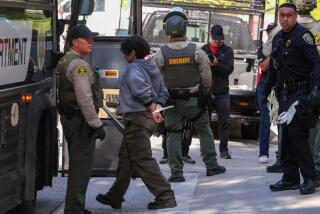Mayor Goode Helpless to Defuse Threat : Saw Danger Posed by Radical Group a Year Before May 13 Clash
- Share via
PHILADELPHIA — Mayor W. Wilson Goode, testifying for the first time on his role in the city’s fiery May 13 clash with the militant group MOVE, said Friday that he had determined a year earlier that the fortified house occupied by MOVE presented an “extremely dangerous, explosive situation” but that he was helpless to defuse the growing danger.
“I came to the conclusion that we probably could not solve the problem on Osage Avenue,” Goode told the 11-member commission he appointed to investigate the police assault on MOVE, which left 11 people dead and 61 homes destroyed.
Despite a growing number of complaints from MOVE’s neighbors, Goode said, shortly after he took office last year he ordered all city agencies to avoid any contact with MOVE members--and thus avoid enforcing the law--to prevent a confrontation with the violent radical group.
When 15 neighbors met with Goode on May 28, 1984, to complain about beatings by MOVE members, unsanitary conditions at the MOVE house and to warn that the house was being increasingly fortified, Goode said he offered to make a playground available for their children, provide mental counseling “for the constant noise going on” and unclog a stuffed drain behind the MOVE house.
‘Explosive Situation’
Goode defended his hands-off policy as sound. “It was in my judgment . . . an extremely dangerous, explosive situation that would require very careful, very delicate handling, and that it could not be done quickly or overnight,” he said.
Goode said he decided “not to permit any inspector, and not to permit anyone to approach that house. . . . I did not want to risk any inspector going to the house and pushing a button and risking the lives of the inspector, the people in the house and the residents.”
William B. Lytton, commission staff director, cited a report Goode had received a month later on June 21, 1984, from Dist. Atty. Edward Rendell. Although Rendell advised that it was “imperative to do something as quickly as possible,” Goode said he had no authority to act at the time.
Citizens’ Pleas for Help
Goode appeared without a lawyer for an hour and 15 minutes on the fourth day of the often emotional hearings, at which angry neighbors of the MOVE group testified that they had begged and pleaded for help for more than a year from top city officials.
Goode said he had sought a “comprehensive plan” to avoid bloodshed. Those efforts collapsed on May 13 when police dropped a bomb on the MOVE house after an early morning gun battle and a daylong siege. The bomb started a fire that gutted two city blocks in the well-kept, blue-collar West Philadelphia neighborhood.
Goode said there was “a tremendous amount of confusion about our efforts” before and during the May 13 clash.
“We were in fact seeking simply to make the arrest of five people” on outstanding warrants, he said. The city was not trying to evict MOVE, he said.
Criticism of Mayor
Goode, whose handling of the crisis has been heavily criticized in the wake of the disaster, spoke in a strong, clear voice. He is to resume testifying Tuesday.
In earlier testimony, eight MOVE neighbors complained bitterly that they had gotten no help from Goode’s administration when they reported MOVE’s growing fortifications, including railroad tie reenforcements, a rooftop bunker and window slits for gun ports. They said they had also complained of widespread vermin from garbage and feces scattered near the house.
“We asked for help and nobody gave a damn,” said Clifford Bond, a neighborhood leader.
Another neighbor, Lloyd Wilson, said he had complained directly to Goode and then City Manager Leo Brooks after a MOVE member had attacked and beaten him in August, 1984.
“After a long conversation, they said, ‘Only an act of God could change this,’ ” Wilson said.
MOVE Never Cited
Several mid-level city officials said no city agency ever cited MOVE members for violating health, sanitation or housing regulations, apparently because of Goode’s order not to approach the house.
Yvonne Haskins, a state parole officer, said Philadelphia police had prevented her from serving a criminal warrant on a MOVE leader in June, 1984. Police also stopped a water department employee from shutting off water to the house despite unpaid water bills.
“From all the testimony, we had a house that was above the law,” commented commission member Henry S. Ruth, a former Justice Department Watergate prosecutor.
“MOVE literally ground the bureaucracy of Philadelphia to a screeching halt,” said Bruce Kauffmann, another commission member and former state Supreme Court Justice.
More to Read
Sign up for Essential California
The most important California stories and recommendations in your inbox every morning.
You may occasionally receive promotional content from the Los Angeles Times.













